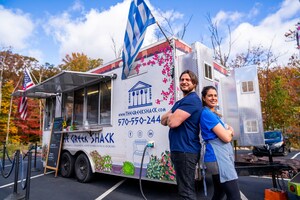
WASHINGTON, Aug. 8, 2019 /PRNewswire/ -- Entrepreneurship remains strong in rural areas, despite a nationwide drop in self-employment over the past 30 years, according to data gathered by SCORE, mentors to America's small businesses. 80% of rural small business owners believe the quality of life and cost of living are superior to urban or suburban areas, although they struggle to find funding, to hire the right workforce and to reliably access digital technology.
"Data shows that rural businesses tend to operate at a higher profitability margin than urban businesses, and they typically earn comparable revenue to urban businesses," said SCORE Acting CEO Bridget Weston. "What this means is that rural entrepreneurs have the advantage of keeping more of their business revenue, which makes it possible for them to provide a higher quality of life for themselves and their families."
Rural areas maintain a slightly higher percentages of entrepreneurs than urban areas:
- 6.5% of people in rural areas were self-employed in 2016, compared to 8.4% in 1988
- 6% of people in suburban areas were self-employed in 2016, compared to 7% in 1988
- 5.7% of people in central cities were self-employed in 2016, compared to 5.2% in 1988
Rural small businesses earn comparable revenue to urban businesses, and are slightly more profitable (56% vs. 53%):
- Revenue earned:
- <$100K in revenue: 21% of both rural and urban small businesses
- $100K-$1M: 52% of rural; 49% of urban
- $1M-$10M: 24% of rural and 26% of urban
- >$10M: 3% of rural and 4% of urban
40% of rural small business owners have trouble accessing capital, so many rely on personal savings:
- Personal savings: 71% of respondents
- Loan from a community bank or credit union: 14%
- Investments or gifts from friends and family: 13%
- Loan from a large bank: 6%
- Angel investor or seed funding: 4%
- Online lender: 3%
- Crowdfunding: 3%
Rural entrepreneurs struggle to find employees with the right skills, experience, and geographic location, citing major barriers such as:
- 74%: Finding candidates with the right education, skills or training
- 72%: Finding candidates with the right kind of experience
- 69%: Lack of talent pool in local area
- 53%: Finding candidates willing to relocate
Digital technology has helped rural small businesses to increase sales, but more than half of rural small businesses do not have reliable access to technology:
- Digital technology increased gross sales for rural businesses by 17.2% during the past three years
- 20% of rural small businesses generate at least 80% of their revenue by selling online
However:
- 56% of rural small businesses do not have reliable access to digital technology
- 20.6% do not have high-speed broadband
- 5.4% still use dial-up access
Download the infographic for more information on trends in rural entrepreneurship.
About SCORE
Since 1964, SCORE has helped more than 11 million aspiring entrepreneurs. Each year, SCORE's 11,000 volunteer business experts provide free small business mentoring sessions, workshops and educational services to clients in 300 chapters nationwide. In 2018, SCORE volunteers helped to create 32,387 new businesses and 103,300 non-owner jobs.
For more information about starting or operating a small business, or on volunteering with SCORE, visit SCORE at www.score.org. Follow @SCOREMentors on Facebook, Instagram and Twitter for the latest small business news and updates.
Contact Information
Betsy Dougert
800-634-0245
[email protected]
SOURCE SCORE







Share this article